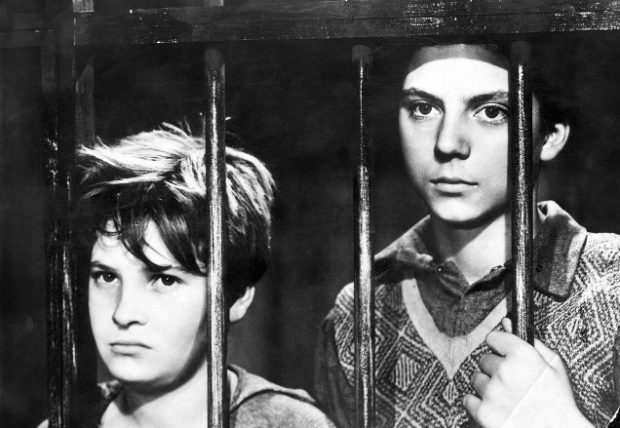
 Vittorio De Sica’s groundbreaking 1946 film about the tribulations of two Italian street kids was one of the founding documents of the film movement known as “neorealism.”
Vittorio De Sica’s groundbreaking 1946 film about the tribulations of two Italian street kids was one of the founding documents of the film movement known as “neorealism.”
In 1946, Italian director Vittorio De Sica made a marvelous film called Shoeshine. It’s about two street urchins in Rome who make their living by shining shoes. Hanging out at the racetrack, they share a dream of owning their own horse to ride, and they scrape their money together to buy a beautiful white horse. But their hapless complicity in an older brother’s theft lands them in juvenile detention. The brutal atmosphere of incarceration introduces these young boys to the pain of abandonment and despair.
This was one of the milestones in the neorealist film movement. Many of the innovations that were hailed by critics—location shooting, use of nonprofessional actors, the grainy documentary style of the photography—were dictated as much by economic necessity as by artistic choice. In any case, the effect is still powerful, especially once the boys get to the reformatory and we witness the complex dynamics of power and submission played out by the inmates, mirroring the world of their jailers.
De Sica, a renowned actor himself, had a way of coaxing wonderfully natural performances from non-actors. Here the two boys, played by Rinaldo Smordoni and Franco Interlenghi, display a great range of feelings, from the most vulnerable tenderness to callous cruelty, and they are very moving. The film has a formal perfection and integrity which is difficult to describe—it’s as if we are peeking into a hidden world of suffering. At the same time the plot elements, such as the horse, work on a wider symbolic level as well. The final sequence is devastating, a shattering cry of anguish and betrayal that you may never forget. It was the first film to win in the new foreign language film category at the Academy Awards.
De Sica, along with Roberto Rossellini and others, pioneered a kind of drama that dealt unflinchingly with the struggles and hardships of the poor and dispossessed. In a world reeling from the trauma of the Second World War, this honesty and directness was like a breath of fresh air. The contrast with the slick studio productions of Hollywood helped foster a revival of interest in film as an art form rather than just entertainment. Two years later, De Sica made the masterpiece The Bicycle Thief, and the worldwide fame of that picture has tended to overshadow Shoeshine in people’s memories. But the earlier film has a tenderness and grace that makes it stand apart, and it deserves to be more widely seen.

